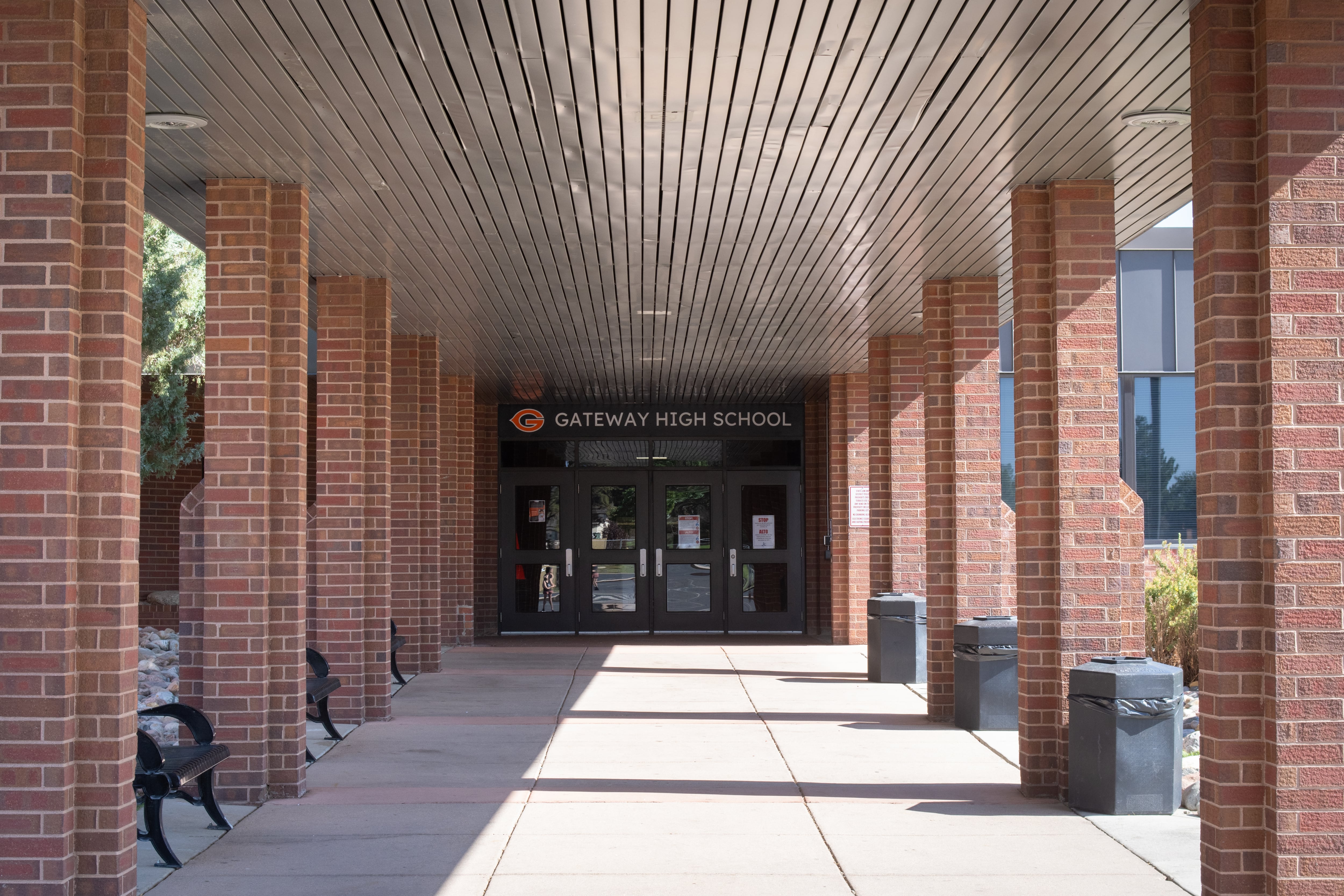The State Board of Education this week is considering a new plan from Aurora leaders to improve Gateway High School, a low-performing school that hasn’t improved with past efforts, and was recently in the spotlight for allegations that a previous principal had misused money and changed student grades.
The district is proposing a plan under state innovation status, which grants the school more autonomy from various state and district rules. An independent review panel found it’s the best option of the ones the state can mandate.
Gateway, which serves about 1,400 students including 90% students of color, has been under state orders since 2019. Ronald Fay, the principal initially hired to oversee the plan, is now under investigation for allegedly embezzling more than $100,000 from the school over a two-year period, starting in 2019, according to a report by Fox31. The report names Fay’s secretary as a possible accomplice.
A whistleblower alerted the district in 2021, prompting an audit, resignation, and criminal investigation. When Aurora Public Schools completed its own internal audit, it sent the information to law enforcement for criminal investigation.
A spokesperson for the district attorney’s office said there was no update on the status of the investigation into the former principal. According to court records, he has not been charged.
State officials say they weren’t aware of the allegations or the problems before this year, when details were first reported by Fox31. In Colorado, state officials don’t oversee school-level finances, and state leaders said they depend on schools being honest in reporting academic data such as grades and graduation rates.
Aurora Public Schools declined an interview request, and board members did not return calls seeking comment.
Groups that worked inside Gateway High School to improve student achievement, Communities in Schools and Zero Dropouts, also said they had no idea about the alleged mismanagement.
The Aurora school board has not discussed the accusations publicly, nor what they mean for district oversight of struggling schools. The district has two other schools on state-ordered improvement plans, and more than a dozen that could be headed for state intervention if they don’t improve in the next few years.
That the alleged misconduct went undetected speaks to the limits of Colorado’s accountability system, which looks at achievement on state tests and some other academic measures, but typically leaves nearly all aspects of district and school governance to local authorities.
“In Colorado there’s local control and a lot of that responsibility falls to the local board,” said Lindsey Jaeckel, executive director of school and district transformation for the state department of education. “In our experience, districts do have strong checks and balances.”
School’s improvement efforts first focused on targeted needs
By 2019, Gateway had received four consecutive years of low ratings — due to low standardized test scores and graduation rates. Rather than wait for a fifth year of low ratings, when state law would then require the State Board to intercede, district leaders proposed their own improvement plan to get ahead of the state and avoid being told what to do. It was the first district to propose a plan ahead of the five-year timeline.
State officials at the time praised the district for the initiative and approved the plan local leaders crafted.
Gateway’s plan was to hire a partial external manager to focus on social emotional learning support. The external manager, Communities in Schools, placed three caseworkers at the school to work with students who needed extra help with nonacademic issues, and help train teachers on how to integrate social and emotional learning support in their classroom work.
But one of the complaints about Fay, at the time, was that he hired a large culture team with unclear job responsibilities at higher pay rates than teachers at the school.
Christopher Murray of Communities in Schools said that his team saw the large number of resources in the school as a bonus, but they weren’t used as well as they could have been.
“We felt it was great, the district and the community are committed to addressing needs in this school,” Murray said. “What I felt was the missing piece was, how are we integrating all of that? There was continued confusion around roles and what we were there to do, and ultimately a lack of trust or buy-in in the school.”
Communities in Schools ended their contract with the district in 2021. Murray said that the organization wanted more cooperation with leadership, a role in decision making, and ultimately felt they were no longer “achieving the outcomes and goals that we wanted to achieve.” The district then revised its improvement plan, which the state approved in the fall of 2021.
In the second version of the improvement plan, Gateway contracted with another organization, Zero Dropouts. This time, the contracted work focused on credit recovery as students were returning to in-person school after initial pandemic disruption.
According to email correspondence obtained through public records requests, there was disagreement about how many students benefited from Zero Dropouts’ work. The independent State Review Panel’s report details problems with the work including no communication with teachers on which of their students were working with the group, whether they needed to approve the recovery work, and a lack of student participation in afternoon and weekend tutoring opportunities the group offered.
The latest state rating, for 2022, showed the school again in “turnaround,” the lowest rating given to schools.
And while the graduation rate improved significantly for the Class of 2020, it has since dropped again to 64.2%, for the Class of 2022, lower than the state rate of 82.3%.
Multiple teachers at the school raised concerns about grades being changed, according to the Fox31 report. A district audit reports that the district investigation had found there were more than 400 grade changes, far more grade changes than at other district high schools. The audit found there was no evidence of grade changes in exchange for payment, but that teachers did feel inappropriately pressured to change them. The audit also states that the internal district investigation into the grade changes may have been inadequate.
Sentinel Colorado reported that during a school board meeting with superintendent finalists this spring, Andre Wright, who was identified as the administrator who oversaw the possibly inadequate investigation into the grade changes, claimed that most of the changes weren’t beneficial to the students and that grades were actually lowered.
“APS should consider whether additional inquiries should be made with respect to the grade change practices at Gateway,” the audit recommendations state. “As Gateway is a turnaround school, metrics related to student performance and graduation are important to the school’s status.”
Since Gateway first got a state-ordered improvement plan in 2019, the school has received a total of $500,000 in state school improvement dollars. State officials said they don’t have any concerns about those dollars having been misspent.
The money is given to districts, not schools themselves, and state officials say they track that the work that is supposed to happen with the grant money does, in fact, happen. In Gateway’s case, the money has gone mostly to pay for the external managers.
Asked if the state could impose penalties related to accounting practices or other financial concerns, Jennifer Okes, chief school operations officer for the Colorado Department of Education, said in an email that districts could face downgraded ratings “if CDE determines a district or charter schools are not in substantial, good-faith compliance.”
“We have not had any instances of this during the past 10 years. While we do have districts that are out of compliance with some provisions from time to time, these have not risen to the level of substantial, good-faith compliance,” she wrote.
A new approach
Gateway’s newest principal, Scott Fiske, hired in January 2022, evaluated the school’s needs and determined that a more comprehensive plan to improve instruction is necessary. The push to use innovation status came after a visit from the state review panel in the fall.
District leadership has also changed, including the chief academic officer, and a new superintendent will start next month.
The school held focus groups with staff and students, and created a plan that would push the school to offer “experiential learning” tied to college and career experiences. Students would get opportunities to do job shadowing, internships, service work, and earn industry certifications.
The school is requesting innovation status waivers including to hire unlicensed teachers for certain career class offerings, have flexibility in the school calendar, and change graduation requirements to offer different diploma options. Graduation requirements would need to at least meet, if not exceed, the district’s requirements.
The local school board approved the plan unanimously in April, after members praised it, as well as the community engagement done while creating the plan. Some school board members asked why this work hadn’t been the focus from the start.
The district and school staff working on Gateway’s improvement plan are all new. They said they believed the people who worked on the original plans hoped more targeted work would be enough. Now district officials want a more comprehensive approach.
Jaeckel, executive director of school and district transformation for the state department of education, said that when state officials do site visits, they focus on systems and helping school and district leaders narrow their focus to a few improvements that can be done well.
“We do seek information about, how are you supporting students who are failing?” Jaeckel said. “We get to see that. But we don’t get down to an individual level, talking to a teacher or even a principal about how did a student end up with a D? It’s more about, are there systems in place?”
Jaeckel said that when the state publicly posts academic data offered by schools, it helps provide accountability because the public can see what is being reported, and ask questions of their local officials.
In Aurora, although the district denied an interview request and school board members haven’t questioned the district’s policies in a public board meeting, the district issued a statement defending their policies.
“We have multiple policies and protocols in place to ensure that funding is used appropriately to serve Aurora Public Schools students,” the district’s statement reads. “We do not tolerate misconduct and hold staff to high standards. We work to fully investigate complaints and concerns. In this case, the actions of the two former employees are appalling. We remain committed to upholding high standards for all employees.”
Yesenia Robles is a reporter for Chalkbeat Colorado covering K-12 school districts and multilingual education. Contact Yesenia at yrobles@chalkbeat.org.





